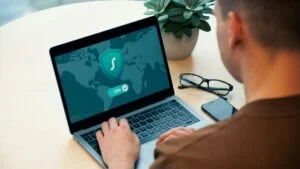In the modern world, what begins as a harmless market search can lead to endless purchases, identity theft, and malicious viruses.
If you aren’t being vigilant about protecting yourself on the Internet, you may find yourself the victim of criminals and scammers.
While the internet is a beautiful place full of entertainment, education, and helpful services, you must always proceed with caution.
How can you strike the balance between enjoying your online activities and staying safe?
Here are some of our favorite cybersecurity tips to stay safe while using the internet.
1. Protect Your Computer With VPN
Cybersecurity is an issue that affects everyone, and every day we hear about new attacks on companies and individuals. One way to protect yourself against these attacks is to use a good VPN.
VPNs (virtual private networks) offer a way to make your online activities anonymous. This means that your IP address will be masked, which can make you difficult to track. For example, when you search on Google “what is my IP” it will not show your real IP, but the one that the VPN has provided from another location.
Using a VPN will also protect you against hackers who are trying to exploit your computer or steal your data. There are many good VPNs available on the market.
Make sure you select one that is authentic and trustworthy. In addition, always remember to use caution when sharing personal information online, especially if you are using a public Wi-Fi connection.
2. Enable Two-Factor Authentication
Two-factor authentication is a security feature that requires users to enter two pieces of information in order to log into their accounts. This can help to protect your account from being hacked.
You can enable two-factor authentication on your account by going to your account settings and clicking on the “Two-Factor Authentication” button. You will then be prompted to set up a password and a second authentication factor. You can choose from a variety of options, such as a phone number, an API key, or a QR code.
By using two-factor authentication, you will reduce the likelihood that your account will be hacked. It is a good way to protect yourself against unwanted access to your account, and it is also useful if you want to keep your personal information safe.
3. Install Antivirus Software
Internet users need to take steps to protect themselves from online threats. One way to do this is by installing antivirus software.
Antivirus software helps to protect users from online threats, such as viruses, spyware, and malware. By installing antivirus software, you can help prevent your computer from being infected with these harmful programs.
Antivirus software can also protect you from phishing attacks, which are when scammers try to steal your login information or other personal information by pretending to be a trusted source.
Regularly updating your antivirus software is also important. This means that the program will detect new types of threats as they emerge. By keeping your antivirus software up-to-date, you can avoid being exposed to any malicious programs.
4. Don’t Click on Pop-Up Ads!
There’s a lot of malicious content online, and one of the ways hackers gain access to people’s personal information is by tricking them into clicking on malicious ads.
One way to prevent yourself from being tricked into clicking on malicious ads is to always be vigilant when browsing the internet. Keep an eye out for pop-up ads, which are usually big and flashy. If you see a pop-up ad that you don’t want to click on, simply close the window or screen containing the ad.
Also, be sure to only visit trusted websites. If you don’t know who founded a website or whether it is reputable, don’t visit it. Instead, search for the website online or check out its ratings from other users.
5. Caution When Opening Email Attachments
It’s important to be cautious when opening email attachments, especially if you don’t know who the sender is. Email attachments can be malicious and could contain viruses or spyware.
If you do decide to open an attachment, make sure that you disable your antivirus software before doing so. Also, don’t click on links in the email unless you are sure that they are safe. Instead, copy the link and paste it into a web browser.
6. Stay Safe on Social Media
One of the most important things that Internet users can do to stay safe is to stay aware of their surroundings and keep track of who is talking to them online.
It’s easy to fall into a conversation on social media that you don’t know anything about. Sometimes people that you talk to online are actually scammers or fraudsters. They may try to trick you into giving them your personal information or money.
To avoid these kinds of scams, take a few minutes every day to check your social media accounts for suspicious activity. Look for posts that seem too good to be true, or posts from people you don’t know.
Also, be sure to check your privacy settings on social media platforms. You can often restrict who can see your posts and comments. This will help protect you from scammers and fraudsters.
7. Keep Your Files and Documents Confidential
Keeping your confidential files and documents safe is important in any business, but it is especially important when conducting business online. Protect your information by making sure to keep your files confidential.
You can also shred any documents that are not needed for business purposes. If you ever need to share information with a colleague, make sure that you do so securely and with the proper security measures in place.
Remember, anything that you send or receive online should be treated as confidential. If something seems off to you, don’t hesitate to contact your trusted advisor for more advice. Cybersecurity is an important topic that every Internet user should know about.
Are You Going to Follow These Cybersecurity Tips?
Cybercrime is on the rise, and with it comes an increased demand for cybersecurity experts. In order to protect yourself from online threats, it is important that you be fully aware of the basics of cybersecurity.
In this article, we’ve provided a comprehensive overview of cybersecurity tips and essentials that every internet user should know. Armed with this information, you can take steps to protect yourself from scam emails and malicious websites.
If you want to read more articles and guides about online protection against hacking and fraud, please browse through other pages of our blog, and stay updated!









